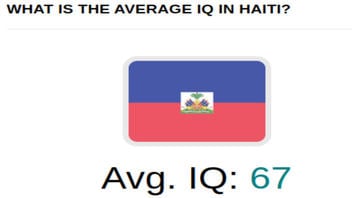STORY UPDATED: check for updates below.

Is the average IQ in Haiti 67 as claimed by various posts on social media? No, that's not true: The number is not based on any actual IQ testing in Haiti. It comes from a decades-old book co-authored by an Irish academic who was later stripped of his title. The book used a questionable methodology based on data from neighboring countries to estimate IQ averages for Haiti. For several countries that data wasn't based on IQ testing either but on academic achievement tests which measure a different thing. Contacted by Lead Stories, a Harvard University expert on human intelligence described it as a claim that cannot be taken seriously.
The claim appeared in a post (archived here) on X, formerly Twitter, on September 9, 2024, under the on-screen title "WHAT IS THE AVERAGE IQ IN HAITI?" It said:
Haiti has an average IQ of 67.
This is what the post looked like on X at the time of writing:
(Source: X screenshot taken on Thu Sep 12 17:32:24 2024 UTC)
The post provided no citation or quotation to support its assertion that Haiti's average IQ is 67.
No hard data for Haiti, just extrapolations
Lead Stories found that number in estimates and extrapolations printed in "IQ and the Wealth of Nations," a controversial 2002 book by the late Ulster (Ireland) University psychology professor Richard Lynn and the late Tatu Vanhanen, professor of political science at the University of Tampere (Finland).
Lynn is described by the Southern Poverty Law Center as an "unapologetic" academic racist who various racist movements on relied for academic-sounding rationale for their claim that white people are superior to nonwhites. He was stripped of his "professor emeritus" status after student leaders complained his racism and sexism were unacceptable and Ulster University agreed.
Lynn and Vanhanen's national IQ averages material is incorporated in a subsequent publication: "INTELLIGENCE: A Unifying Construct for the Social Sciences," found in PDF form on Lynn's ResearchGate page.
The chart with Haiti's average IQ estimate is found in Figure 2.1 on page 44 of the PDF.
Leading up to the chart, the authors listed multiple limitations of their data.
Dozens of the world's 189 nations did not measure IQ at the turn of the 21st century. Lynn and Vanhanen summarized the problem thus:
The data are not all of equal quality.
In the case of Haiti and 41 other countries, there is no IQ data at all, as is indicated by brackets around the nation name shown in the Lead Stories montage of excerpts below.
For those countries with no test data of any kind, Lynn and Vanhanen extrapolated IQ averages from neighboring countries' data, even if those comparison countries had only standardized academic test data.
The authors attribute an IQ average of 82 to Haiti's neighbor on the island of Hispaniola, the Dominican Republic, but 67 to Haiti. The 18 percent difference is not explained.
For the Dominican Republic and 21 other countries on the chart, there is no IQ test data, but there are academic test data. The authors wrote that they used standardized academic achievement tests to estimate average national IQ, declaring academic achievement correlates directly to IQ.
Scholars attacked Lynn and Vanhanen's findings on a number of fronts, including the biases inherent in their assumptions as well as their use of scores that measure academic abilities, as opposed to the raw intelligence an IQ test is meant to measure.
Reviews at time of publication
The European Sociological Review (archived here) took the findings, which included Haiti's low average IQ, to task. In a September 1, 2003, critique of the book "IQ and the Wealth of Nations," author Thomas Volken said:
[T]heir findings must be considered as highly problematic. The authors neither make use of state‐of‐the‐art methodological techniques nor can they substantiate their theoretical claims.
In a September 2008 review of the book (archived here), Professor Stephen Morse, then at the University of Reading in the United Kingdom and now at the University of Surrey, said this about the book's findings:
To me the danger of the Lynn and Vanhanen hypothesis is two-fold. Poor science all too easily highlighted by the assumptions made of IQ and its supposed link to race is the most obvious and easily decried element of the exercise ...
A 2024 critique
Howard Gardner, a professor of cognition and education at Harvard's Graduate School of Education, said in a September 12, 2024, email to Lead Stories, "I cannot take this claim seriously" when asked about the social media post and the purported 67 IQ average. He continued:
First of all, while IQ tests are useful for some purposes (predicting who may have trouble in a certain kind of school), they are not predictive of life chances or successes, particularly for those outside of a conventional Western schooling system. And indeed, in an AI era, they may not be predictive at all.
Second, and I have been a leader here, views of intelligence have expanded greatly since the original IQ tests were developed in France over a century ago. My own work is on 'multiple intelligences' but there are many other scholars who challenge the standard IQ view.
Third, all tests are culturally sensitive.
For an IQ test to be "culturally sensitive," it must be designed to be fair to everyone, no matter where they come from or their culture. To do this, the people who create the tests make sure they don't favor any particular group and that they measure what they are supposed to for everyone equally. They consider different languages, customs and experiences so that everyone has a fair chance to show what they know.
Read more
Additional Lead Stories fact checks of claims about Haiti or Haitian immigrants can be found here.
Updates:
-
2024-09-13T22:51:44Z 2024-09-13T22:51:44Z Adds direct link to data chart, illustration with excerpts from "Intelligence" book and revises explanations of a study that linked national IQ averages to other measures.



















